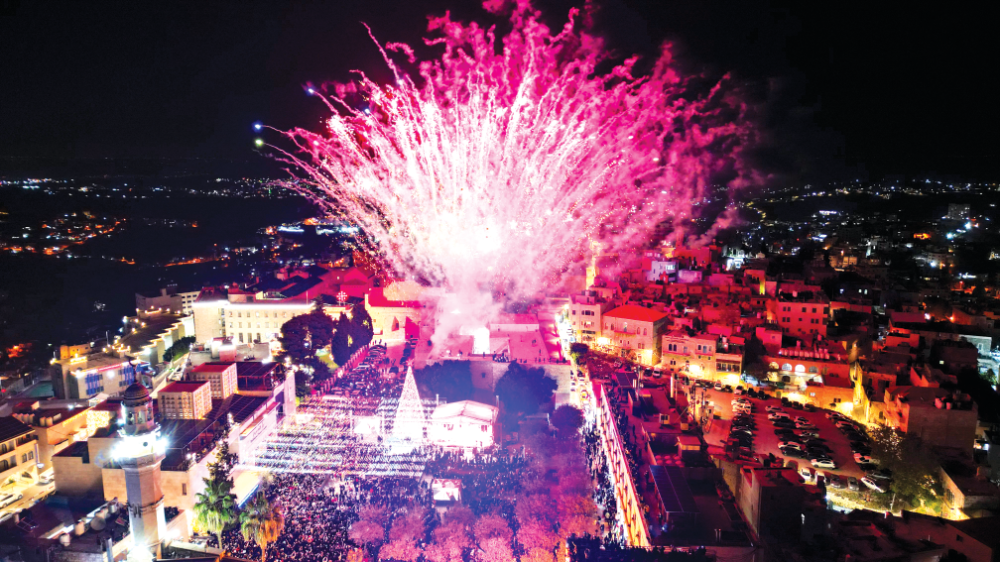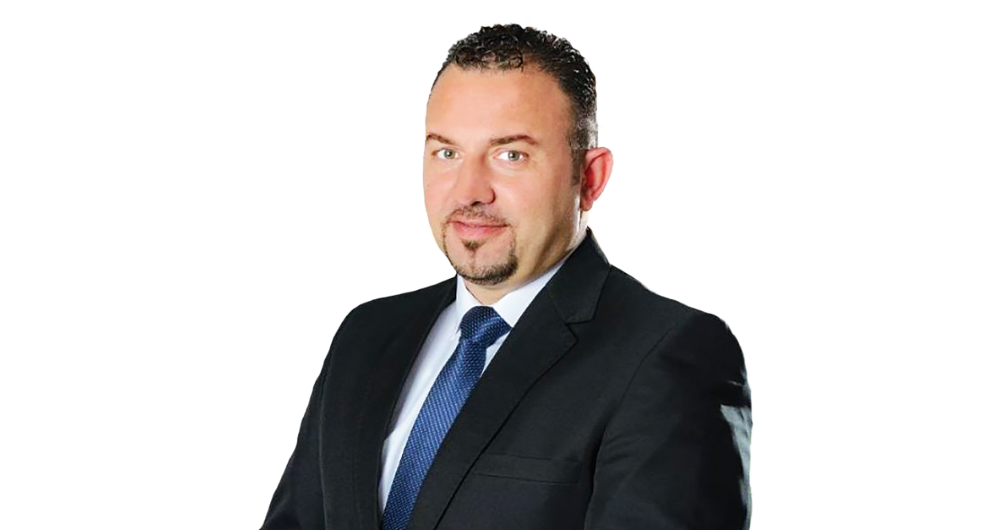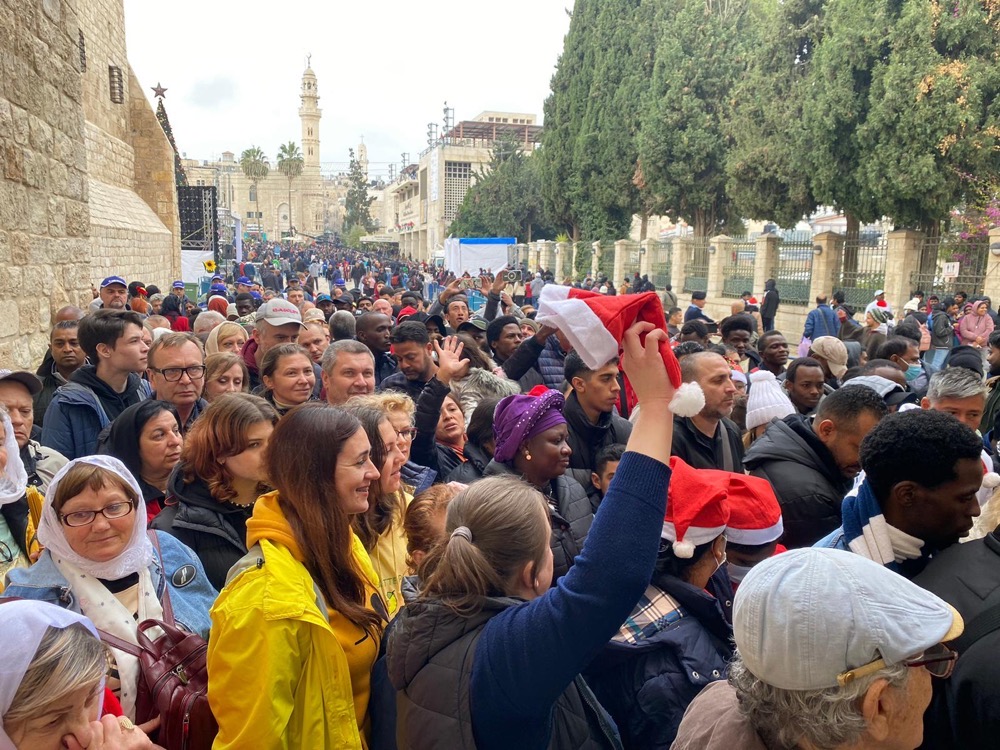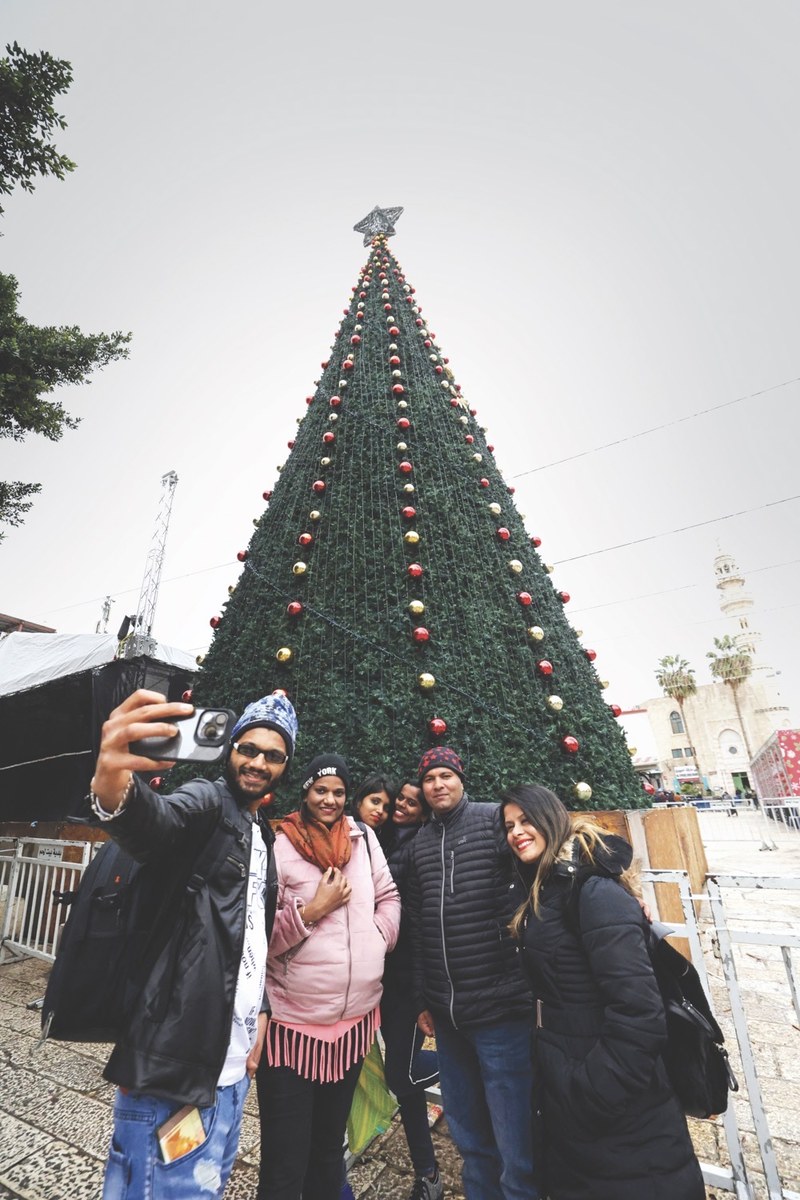BETHLEHEM: Bethlehem, the birthplace of Jesus Christ, is an unusual place: An Arab city, with a respected Christian Palestinian mayor, yet living under Israeli occupation. Like other urban areas in the occupied West Bank, the city is surrounded by illegal settlements and constricted by a high wall, constantly under the watch of Israeli soldiers.
Palestinians are especially fearful this Christmas, with Benjamin Netanyahu set to return as Israeli prime minister at the helm of the most hardline Cabinet in the country’s history.
But the settlements, the wall, the occupation and the inevitability of a new radical-right government in Israel are not stopping Bethlehem’s mayor, Hanna Hanania, from focusing on the positive, at least during the Christmas holidays.
In an interview with Arab News, he described the city as a source of light for the world and a place that brings people together.

Fireworks mark the lighting of the Christmas tree in Bethlehem’s Manger Square, by the Church of the Nativity, revered as the site of Jesus Christ’s birth. (AFP)
“When I turned on the lights of the Christmas tree in Bethlehem’s Manger Square on Dec. 3, I said the light of the tree will radiate to the world our desire for peace,” he said. “We chose the theme of the holidays that Christmas brings people together.”
Hanania, who was elected in March, will be officiating the city’s three annual Christmas events. Catholics and Protestants celebrate Christmas Eve on Dec. 24, Orthodox and other eastern churches on Jan. 6, while Armenians wait until Jan. 18.
The city’s crown jewels are the 1,700-year-old Church of the Nativity and the historic Star Street, both of which have been recognized by UNESCO as protected World Heritage sites.
Sophia Vantunu, a 35-year-old tourist from the US state of New Jersey, considers it a privilege to be celebrating Christmas in the holy city of Bethlehem.
“Especially for me, this was unique in many ways, including the lighting of the tree and the festivities that took place in and around Bethlehem,” she told Arab News.
George Menah, a Bethlehem tour guide, says the Church of the Nativity — built on what is believed to be the site of Christ’s birth — and the city’s many other heritage and religious sites are extremely popular with tourists and pilgrims.
“The Church of the Nativity is one of the oldest churches in the world and the city,” he told Arab News. “Throughout history, several holy treasures have been found there. Now, new discoveries are continuously being made, and the church is still being gradually explored for these artifacts.”
This year marks the 150th anniversary of the establishment of Bethlehem as a municipality. Over the past century and a half, its population has swelled — as have the number of hotels, which were not available to Mary and Joseph that night, now more than 2,000 years ago.

“We want visitors to engage with the living stone and the Palestinians who have lived in this city,” said Hanna Hanania, Mayor of Bethlehem. (Supplied)
However, Hanania says the growth of the city’s population and its infrastructure has been restricted by the occupation.
“Israel built an eight-meter-high concrete wall deep inside our land, and they refused to allow us to enjoy our normal growth in terms of our city plans due to the imposition of illegal Jewish settlements in the Bethlehem area,” he told Arab News.
For the people of Bethlehem, the pain of the occupation is palpable in more ways than just stymied economic growth. At the beginning of this month, Israeli forces killed one and injured six Palestinians in a refugee camp south of the city after clashes broke out following Israeli raids on the camp.
The uncertain political situation notwithstanding, Palestinians in Bethlehem have embraced the influx of tourists. Bob Felton, a 50-year-old tourist from Greece, says he is thrilled to visit the holy city following the lifting of pandemic travel restrictions.
“After being stuck home for over two years due to the coronavirus, we were very excited to visit Bethlehem, a holy city that represents Christmas and Christ,” Felton told Arab News. “We pray that the years to come will be nice and that we will feel the spirit of Christmas in this holy city.”
Nina Azar, a Palestinian tour guide, avers that the city’s emergence from the pandemic has resulted in a flood of visitors. “Tourism has returned this year, gradually and more vigorously than in previous years, with visitors coming from various nations to feast in the holy city,” she told Arab News.
Echoing Azar’s optimism, Hanania says the tourism industry and visitor numbers are now back to pre-pandemic levels. “The city’s hotels, shops, and restaurants are again bustling with visitors who want to see and touch the birthplace of Jesus. In November this year alone, 123,000 visited Bethlehem,” he told Arab News.
Joseph Giacaman, a souvenir-shop owner in Manger Square, concurs that tourism has picked up this year.

Christian pilgrims praying in the grotto of the Church of the Nativity on Christmas Eve in 2019. (AFP)
“We have increased in numbers compared to last year, and the economic state has become better in the city, so we are making more money this year because demand has increased, and supply is limited due to the fact that there are a lot more products that are being shipped abroad,” he told Arab News.
“We are able to get better prices because demand has increased, and supply has been limited because many workplaces are shipping their products abroad in much larger amounts than usual.”
Bethlehem is famous for its olivewood handcrafts. Mohanad Ramadan, a wood worker, says his business has seen an increase in exports. “Last year, I could not export products abroad because we did not have strong tourism, but this year things are much better,” he told Arab News.
Bethlehem’s religious sites have undergone significant restoration over the centuries and recent decades.
FASTFACTS
• Bethlehem was the site of the Nativity of Jesus Christ, according to the Gospels.
• The site of the nativity of Jesus was identified as a manger in “a cave close to the village.”
• In 1995 Israel ceded control of Bethlehem to Palestinian Authority in preparation for a two-state solution.
Haytham Daiek, a tour guide, said that after the destruction of the Church of the Nativity during the Samaritan uprising of 529, Justinian I, the Eastern Roman emperor, ordered his envoy to rebuild it in its present form in 540.
Justinian raised the level of the floor, lengthened the church, added a narthex and mosaics, and replaced the octagonal apse with a more spacious triapsal form.
Daiek, who also lectures at Bethlehem Bible College, says that between 1165 and 1169, the church was again restored as a result of the cooperation between Amaury I, the king of Jerusalem, and Byzantine Emperor Manuel Comnenus. It was during this period that the church was filled with mosaics, on its walls, in the nave and the transepts.
However, neglect and vandalism took a toll in later years. “In the 13th century, repairs were permitted only infrequently, and the deterioration of the church (was compounded) by looting,” said Daiek.

Traditional Christmas Eve parades in Bethlehem. (Supplied)
The Latin Patriarchate of Jerusalem’s website states that in the 15th century, under the patronage of the Custos of the Holy Land Father Giovanni Tomacelli da Napoli, and after the approval of the sultan and the Holy See, the church roof was restored.
The wood for the project was donated and sent from the Republic of Venice, Edward IV of England donated the lead, while the Duke of Burgundy Philip the Good paid for the work.
The depredations of conflict did not stop with the end of the Crusades. In early April 2002, Israeli forces besieged the Church of the Nativity while targeting suspected Palestinian militants who had taken shelter there.
The southern gate of the church was destroyed during Israeli shelling, a monk was wounded by Israeli snipers, and journalists attempting to cover the siege were stopped and even fired upon by Israeli forces.
By the time the siege ended weeks later, several Palestinians were dead and dozens injured. (The Palestinians wanted by the Israeli forces turned themselves in and were exiled to Europe and the Gaza Strip).
This Christmas, Hanania is looking to the future and taking pride in the restoration works underway in the basilica, which began in 2013 after Ziad Al-Bandak, president of the Palestinian Presidential Committee for the Restoration of the Church of the Nativity, awarded the contract to Piacenti SpA and Community Development Group.

People take selfies in front of the Christmas tree in Bethlehem’s Manger Square ahead of its lighting. (AFP)
The signing of the contract took place in the presence of Rami Hamdallah, the former Palestinian National Authority prime minister, and representatives of the Greek Orthodox Patriarchate, Armenian Patriarchate, and the Custody of the Holy Land.
Hanania says he strongly believes in the theme of togetherness during this Christmas season. However, “the fact that we have been living for decades under occupation means that we cannot enjoy as a nation the togetherness that we all want on holidays,” he told Arab News.
“Our people in Gaza are partially prevented from coming to Bethlehem. Our brothers and sisters in Jordan and other locations have a huge problem getting visas and permissions (from) an occupying power that applies exaggerated restrictions on entry.”
For the situation to improve, Hanania says, the key is human engagement. “We are not interested in tourists and pilgrims visiting empty churches that look like a museum,” he told Arab News.
“We want them to engage with the living stone and the Palestinians who have lived in this city and have held the faith since the birth of Jesus.”

























